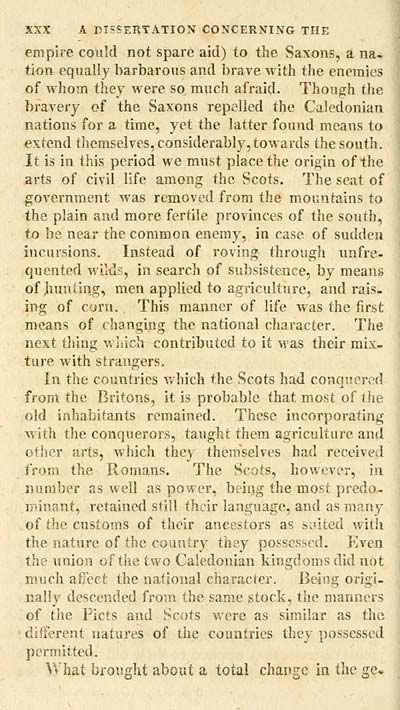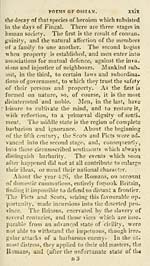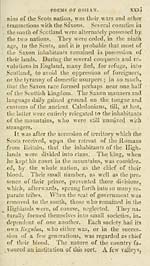Ossian Collection > Poems of Ossian > Volume 1
(48)
Download files
Complete book:
Individual page:
Thumbnail gallery: Grid view | List view

XXX A DISSERTATION CONCERNING THE
empire could not spare aid) to the Saxons, a na-
tion equally barbarous and brave with the enemies
of whom they were so much afraid. Though the
bravery of the Saxons repelled the Caledonian
nations for a time, yet the latter found means to
extend tliemselves, considerably, towards the south.
It is in this period we must place the origin of the
arts of civil life among the Scots. The seat of
government was removed from the mountains to
the plain and more fertile provinces of the south,
to be near the common enemy, in case of sudden
incursions. Instead of roving through unfre-
quented v/ilus, in search of su]}sistence, by means
of ]iunting, men applied to agriculture, and rais-
ing of corn. This manner of life was the first
means of changing the national character. The
next thing which contributed to it was their mix-
ture with strangers.
In the countries which the Scots had conqiierc^d
from the Britons, it is probable that most of the
old inhabitants remained. These incorporating
with the conquerors, taught them agriculture and
otiier arts, which they themselves had received
from the Romans. The Scots, however, in
number as well as power, being the most predo-
ir-inant, retained still their language, and as many
of the customs of their ancestors as suited with
the nature of the country they possessed. Even
the union of the two Caledonian kingdoms did not
much afiect the national character. Being origi-
nally descended from the same stock, the manners
of the Picts and Scots were as similar as tha
difterent natures of the countries they possessed
permitted.
Vtliat brought about a total change in the gc*
empire could not spare aid) to the Saxons, a na-
tion equally barbarous and brave with the enemies
of whom they were so much afraid. Though the
bravery of the Saxons repelled the Caledonian
nations for a time, yet the latter found means to
extend tliemselves, considerably, towards the south.
It is in this period we must place the origin of the
arts of civil life among the Scots. The seat of
government was removed from the mountains to
the plain and more fertile provinces of the south,
to be near the common enemy, in case of sudden
incursions. Instead of roving through unfre-
quented v/ilus, in search of su]}sistence, by means
of ]iunting, men applied to agriculture, and rais-
ing of corn. This manner of life was the first
means of changing the national character. The
next thing which contributed to it was their mix-
ture with strangers.
In the countries which the Scots had conqiierc^d
from the Britons, it is probable that most of the
old inhabitants remained. These incorporating
with the conquerors, taught them agriculture and
otiier arts, which they themselves had received
from the Romans. The Scots, however, in
number as well as power, being the most predo-
ir-inant, retained still their language, and as many
of the customs of their ancestors as suited with
the nature of the country they possessed. Even
the union of the two Caledonian kingdoms did not
much afiect the national character. Being origi-
nally descended from the same stock, the manners
of the Picts and Scots were as similar as tha
difterent natures of the countries they possessed
permitted.
Vtliat brought about a total change in the gc*
Set display mode to: Large image | Transcription
Images and transcriptions on this page, including medium image downloads, may be used under the Creative Commons Attribution 4.0 International Licence unless otherwise stated. ![]()
| Early Gaelic Book Collections > Ossian Collection > Poems of Ossian > Volume 1 > (48) |
|---|
| Permanent URL | https://digital.nls.uk/77946844 |
|---|
| Shelfmark | Oss.79 |
|---|---|
| Additional NLS resources: | |
| Attribution and copyright: |
|
| Description | " ... to which are prefixed, 'Dissertations on the aera and poems of Ossian translated by James Macpherson'". |
|---|---|
| Shelfmark | Oss.79-80 |
| Additional NLS resources: | |
| Description | Selected books from the Ossian Collection of 327 volumes, originally assembled by J. Norman Methven of Perth. Different editions and translations of James MacPherson's epic poem 'Ossian', some with a map of the 'Kingdom of Connor'. Also secondary material relating to Ossianic poetry and the Ossian controversy. |
|---|
| Description | Selected items from five 'Special and Named Printed Collections'. Includes books in Gaelic and other Celtic languages, works about the Gaels, their languages, literature, culture and history. |
|---|

